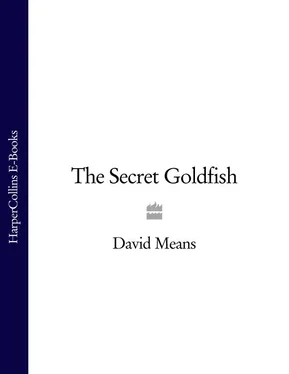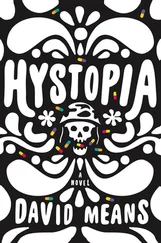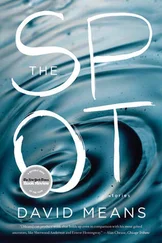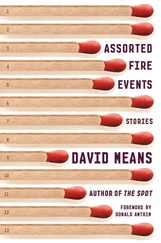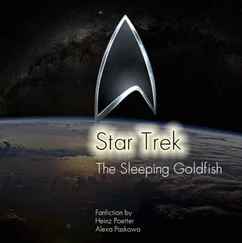David Means - The Secret Goldfish
Здесь есть возможность читать онлайн «David Means - The Secret Goldfish» — ознакомительный отрывок электронной книги совершенно бесплатно, а после прочтения отрывка купить полную версию. В некоторых случаях можно слушать аудио, скачать через торрент в формате fb2 и присутствует краткое содержание. Жанр: unrecognised, на английском языке. Описание произведения, (предисловие) а так же отзывы посетителей доступны на портале библиотеки ЛибКат.
- Название:The Secret Goldfish
- Автор:
- Жанр:
- Год:неизвестен
- ISBN:нет данных
- Рейтинг книги:4 / 5. Голосов: 1
-
Избранное:Добавить в избранное
- Отзывы:
-
Ваша оценка:
- 80
- 1
- 2
- 3
- 4
- 5
The Secret Goldfish: краткое содержание, описание и аннотация
Предлагаем к чтению аннотацию, описание, краткое содержание или предисловие (зависит от того, что написал сам автор книги «The Secret Goldfish»). Если вы не нашли необходимую информацию о книге — напишите в комментариях, мы постараемся отыскать её.
The Secret Goldfish — читать онлайн ознакомительный отрывок
Ниже представлен текст книги, разбитый по страницам. Система сохранения места последней прочитанной страницы, позволяет с удобством читать онлайн бесплатно книгу «The Secret Goldfish», без необходимости каждый раз заново искать на чём Вы остановились. Поставьте закладку, и сможете в любой момент перейти на страницу, на которой закончили чтение.
Интервал:
Закладка:
The fourth had his name on it and was a barn burner, the kind you see locking horns with the Empire State Building. As it came down he talked to it, holding his arms up for an embrace. This was, again, in a boat, out in the middle of Lake Michigan, trolling for coho and steelhead. (He liked the stupid simplicity of fishing in this manner, keeping an eye on the sonar, dragging a downrigger through the depths of the lake, leaning back in his seat, and waiting.) The boat’s captain, Pete, caught the edge of the bolt and was burned to a crisp. Nick held a conversation with the big one as he took the full brunt. It went something like this: no matter what, I’ll match you, you prick, this story, my story, a hayseed from central Illinois, struck once, twice for good luck, third time, a charm, and now, oh by Jupiter! by Jove! or whatever, oh storm of narrative and calamity. Oh glorious grand design of nature. Rage through me. Grant my heart the guts to resist but not too much. Make me, oh Lord, a good conductor. I will suffer imitatone Christi, taking on the burdens of the current and endeavoring to live again.
Shortly after his release from Chicago General, he began weekly attendance of the Second Church of God (or was it the Third?), where he met his first wife, Agnes, who bore an uncanny resemblance to Lucy (same peaches-and-cream complexion). When it came to his past and his history with lightning, scars aside, he had the reticence of a Cold War spy: the book was closed on cloud-to-ground, on hexes, on lightning rod drummers, and the mystical crowd. (He had been offered gigs selling Pro-teck-o-Charge Safe-T rods. LIGHTNING IS THE NO. 1 CAUSE OF BARN FIRES!!!! and from 1–800-Know Your Future.) The book was closed on media interviews, on direct one-on-one confrontations with big bolts. (He in no way worried about smaller variants of lightning, those stray electrical fields that haunt most houses, those freak power surges that melt phone lines and blow phones blank, or those bolts of energy that float bemused into farmhouse windows.) Later he’d come to think that he had been willfully ignoring these forms and thereby picked a fight with them. Once, a film crew from France tracked him down to dredge up the past, but for the most part he urged himself into a normal life and felt bereft of charge, working at the PR firm, representing some commodities brokers, so that when the next strike came it was out of the blue—the blue yonder, a rogue bit of static charge, summer heat lightning. This time he and Agnes were safely ensconced in their summer rental in upstate Michigan watching the Cubs on television. Agnes lay prone on the divan wearing only panties and a bra, exposing her long legs and her schoolgirl belly and the dimpled muscles of thigh. The cobwebby bolt radiated in a blue antimacassar across the window screen, collected itself, swept through the window, and seemed to congeal around her so that in that brief moment before she was killed, before the power failure plunged the room into black, he was granted a photo negative of her glorious form.
To get away from Chicago, he bought the old family farm, rebuilt the big barn, installing along its roof line six rods with fat blue bulbs attached to thick braided aluminum wires dangling from the barn’s sides. The horizon in those parts let the sky win. Even the corn seemed to be hunching low in anticipation of the next strike. In the evenings he read Kant and began dating a woman named Stacy, a large-boned farm widow who dabbled in poetry and quoted from T. S. Eliot, the whole first section of “Ash Wednesday,” for example, and entire scenes from The Cocktail Party. Nick was fifty now, lean from the fieldwork, with chronic back pain from driving the combine. But he loved the work. He loved the long stretches of being alone in the cab, listening to Mozart sonatas while the corn marched forward into the arch lights, eager to be engulfed by the mawing machine. Behind the cab—in the starlit darkness—emerged the bald swath of landscape.
No more messing around. His days of heady challenge were over, Nick thought, ignoring the pliant flexible nature of lightning itself, the dramatically disjointed manner in which it put itself into the air, the double-jointed way it could defy itself. The Morrison homestead was about as dead out-there as you could get. He was working night and day to harvest the soybeans, trying to compete with the big Iowa industrial farms. Too tired to give a shit. Thunderstorm season was mostly done. Those fall storms that heaved through seemed exhausted and bored with the earth, offering up a pathetic rain, if anything.
The bolt that struck him the sixth time came out from under the veil of the sky—as witnessed by his farmhand, Earl, who was unhitching some equipment and just happened to glance at Nick resting his back in the yellow lawn chair. The whopper bolt struck twenty feet away from Nick, balled itself up, rolled to his feet, and exploded. He flew head over heels against the barn. In the hospital he remembered the medicine ball exercises from grammar school gym class, heaving the leather-clad ball at each other, relishing the absurdity of the game: trying like hell to knock the other guy over, to overcome him with the inertia of the object. To properly catch a medicine ball you had to absorb the force and fall back with it so that at some point both you and the ball’s momentum were married to each other. It was a delicate dance. He was pretty good at it.
Nick suffered further neurological damage, strange visions, a sparkling bloom of fireworks under his eyelids. He began to remember. It became clear. He had separated from himself during the strike. A doppelganger of sorts had emerged from his body: a little stoop-shouldered man, thin and frail, making small poking gestures with his cane as he listed forward. A soil sniffer of the old type. A man who could gather up a palm full of dirt and bring it to his nose and give you a rundown of its qualities—moistness and pH and lime content; this was the old dirt farmer of yore who knew his dry-farming methods and gave long intricate dances to the sky urging the beastly drought to come to an end. This man longed more than anything for the clouds to burst open at its seams, for a release of tension in the air, for not just thunder and lightning but the downpour the land deserved. He was a remnant of all those dry-method farmers of yesterday: failed and broken by the land, trying as best they could to find the fix, an old traditional rain dance, or a man who came with a cannon to shoot holes in the sky. Beneath the spot where the lightning ball had landed the soil had fused to glass, and below that—Earl took a shovel and dug it up—the glass extended in an icicle five feet long, branching down to the underground cable that delivered current from the old barn to the storage shed. A power-company representative explained that these underground cables were as prone as aboveground wires to lightning strikes. God knows why, he added.
For three weeks Stacy sat beside his hospital bed and accompanied his anguish by singing odes and folk songs and small ditties she’d picked up as a kid in Alabama, in addition to going through the complete collected poems of Eliot. She had a pure hard voice that seemed carved out of the American soil. In the bandage casing, amid the welts of itching and the drips of sweat running down his legs—all unreachable locations—he had acute visions of combat in Korea, the U.S. First Cavalry Division taking the full brunt of a barrage of Katyusha rockets—until bolt no. 8 (as he envisioned it) intervened, with its thick girth, the revoltingly huge embrace of the horizon as it came eagerly down. It was the big one, the finalization of several conjoining forks into one, unimaginable fury.
After Stacy took off on him, he put the farm up for sale and moved six miles to the north. He would live a bachelor life in a small Illinois town. A siege mentality had set in. He would hunker down, avoid fate by immersing himself in the lackluster flow of the landscape, in the view from his room over the Ellison Feed & Seed store, a vista so boring it made you want to spit (and he did). Boarding in the rooms around him were exiled farm boys who sniffed glue from brown bags, listened to music, and whiled away days writing on the walls with Magic Markers. There was nobody as deviant and lost as an ex-farm boy, he would come to learn. They were depressed from knowing that the whole concept of the farm—the agrarian mythos of land-human love, not to mention the toil and tribulation of their own kin, who had suffered dust bowls, drought, and seed molds—had been reduced to a historical joke. Industrial farms ruled. Left perplexed in their skin, they listened to hip-hop, attempted more urbane poses (many had missing limbs), smoked crack and jimsonweed, stalked the night half naked in their overalls, carved tattoos into their own arms. Nick felt akin to them. In their own way, they’d been struck by lightning, too.
Читать дальшеИнтервал:
Закладка:
Похожие книги на «The Secret Goldfish»
Представляем Вашему вниманию похожие книги на «The Secret Goldfish» списком для выбора. Мы отобрали схожую по названию и смыслу литературу в надежде предоставить читателям больше вариантов отыскать новые, интересные, ещё непрочитанные произведения.
Обсуждение, отзывы о книге «The Secret Goldfish» и просто собственные мнения читателей. Оставьте ваши комментарии, напишите, что Вы думаете о произведении, его смысле или главных героях. Укажите что конкретно понравилось, а что нет, и почему Вы так считаете.
